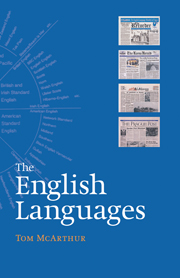3 - Cracks in the academic monolith
Published online by Cambridge University Press: 12 October 2018
Summary
monolith mon'o-lith, n a Single block of stone forming a pillar or column; anything resembling a monolith in uniformity, massiveness or intractability. - adj monolith'ic relating to or resembling a monolith; (of a State, an organization, etc) massive, and undifferentiated throughout; intractable for this reason…
(definition, Catherine Schwarz (ed.) The Chambers Dictionary, Edinburgh: 1993)An apostolic succession? - Reviews of the language
The study of English is an international industry. Tens of thousands of scholars engage in it throughout the world, teaching a Student population of millions and producing innumerable books, periodicals, monographs, dissertations, papers, articles, reports, Conference proceedings, class notes, course books, newsletters, and Internet contributions. Their total Output is more than any one of them can ever hope to digest, and in many cases few will see - or even be informed about - every publication or other document which touches on their areas of Special interest. By and large, however, academics and others who are engaged professionally in the study of English know - or at least know about - the pre-eminent publications in their field. Many such publications have appeared throughout this Century, at least nine of which have had the same archetypal title, The English Language. (For details, see panel 3.1.)
Although these books differ considerably in perspective, aim, content, and style (and have no official link one with another), the deliberate manner in which their authors and publishers have used the same all-encompassing title lends them an institutional quality. The authors as it were proceed in apostolic succession, each charged with producing the latest interim report on the same vast on-going project. Although all report that the object of their study has been diverse from the beginning and has changed over the centuries, their shared title suggests - despite all such diversity and change - that the subject has nonetheless stayed the same. It was English 1,500 years ago when its disunited Speakers arrived in Britain; it was English despite the consequences of the invasions of first the Norse then the Normans; it then remained English despite centurieslong infusions of vocabulary from French, Latin, Greek, and other sources; it was still English after it had spread from the home archipelago to every continent in the world; and it remains English, as its varieties burgeon and its more-or-less Standard more-or-less internationalized form becomes the most universal linguistic entity that humankind has ever known.
- Type
- Chapter
- Information
- The English Languages , pp. 56 - 77Publisher: Cambridge University PressPrint publication year: 1998



